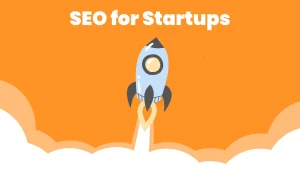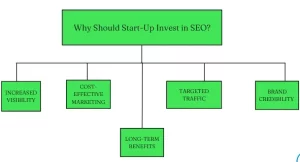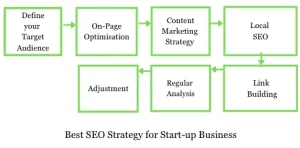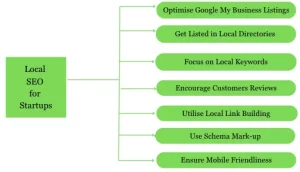SEO for Startups: Tips & Strategies for 2024
Performing SEO for startups and integrating it into the core of a website or product can more effectively meet the needs of both search engines and users, ultimately leading to better visibility and higher rankings in search results.
“SEO is a marketing function for sure, but it needs to be baked into a product, not slapped on like icing after the cake is baked.”- Rand Fishkin

The worth of the SEO industry is over $50 billion as of 2023. But 75% of people will never go past the first page of Google. Hence optimizing the website for higher ranking is important.
Why should startups invest in SEO?
SEO for startups is important because without SEO, you will be waiting for results that will not even align or fall in place because of excessive competition.
These are the benefits of SEO for startups is important for several reasons that include:

Increased Visibility:
SEO helps your startup to rank higher in search engine results, making it easier for potential customers to find you. This increased visibility can lead to more website traffic, resulting in higher sales and revenue.
Cost-effective Marketing:
SEO can be a cost-effective marketing strategy for startups. While some initial investment may be required to optimize your website and create quality content, the long-term benefits can be significant. Compared to traditional marketing methods such as advertising or direct mail, SEO can be more cost-effective in terms of ROI.
Targeted Traffic:
SEO allows you to target specific keywords and phrases that potential customers are searching for. Optimizing your website and content around these keywords can attract more qualified traffic to your site. This targeted traffic is more likely to convert into customers, which can increase your revenue and profitability.
Builds Brand Credibility:
When your startup ranks high in search engine results, it can build brand credibility and trust. Customers are more likely to trust and buy from companies that appear at the top of search engine results. Investing in SEO can establish your startup as a credible and trustworthy brand in your industry.
Long-term Benefits:
SEO is a long-term marketing strategy that can provide lasting benefits. While it may take some time to see results, your efforts to optimize your website and create quality content can continue to drive traffic and revenue for years to come.
Also Read: SEO Guidebook
What makes startup SEO different from regular SEO?
Startup SEO and regular SEO share many similarities, as both focus on optimizing a website to improve its search engine ranking and increase visibility.
However, there are some critical differences between the two, including:
- Limited Resources: Startups often need more resources, which can impact their SEO strategy. They may have smaller budgets for SEO efforts and may need a larger team to handle optimization tasks. Therefore, startup SEO often requires a more focused and targeted approach to maximize results.
- Greater Focus on Local SEO: Startups may need to focus more on local SEO to attract customers in their area. They may also need to optimize their mobile device website to target customers searching for products or services on the go.
- Rapid Growth: Startups often experience rapid growth in a short period of time, which can impact their SEO strategy. They need to adapt quickly to changes in their market and adjust their SEO tactics to keep up with the growth.
- Emphasis on Branding: Startups need to establish their brand in the market to stand out from their competitors. This can involve creating unique content and branding that resonates with their target audience and building strong backlinks and a social media presence.
- Innovation: Startups often need to be more innovative with their SEO strategies to gain a competitive advantage. They may need to explore new and creative tactics, such as influencer marketing or social media advertising, to reach their target audience.
Quick Byte Here:
| Aspect | StartUp SEO | Regular SEO |
| Optimisation Goal | Improve search engine ranking and increase visibility | Improve search engine ranking and increase visibility |
| Resources | Limited resources, smaller budgets, and smaller teams | More resources, bigger budgets, and bigger teams |
| Focus | More focused and targeted approach to maximize results | Broader Approach |
| Local SEO | Greater focus on local SEO to attract nearby customers | Less emphasis on local SEO |
| Mobile Optimisation | More emphasis on mobile optimization to target on-the-go customers | May not emphasize mobile optimization as much |
| Rapid Growth | Need to adapt quickly to changes in market and adjust SEO tactics to keep up with growth | Less likely to experience rapid growth that impacts SEO strategy |
| Branding | Emphasis on establishing brand in the market, creating unique content and branding, building strong backlinks and a social media presence | Still important, but less emphasis on establishing brand |
| Innovation | Need to be more innovative with SEO strategies to gain a competitive advantage, may explore new and creative tactics such as influencer marketing or social media advertising | May rely more on tried and true SEO tactics |
Best SEO strategy for startup businesses

For startup businesses, the best SEO strategy involves a combination of on-page optimization, content marketing, local SEO, and link building. Here are some key elements of an effective SEO strategy for startups:
Read : 5 Essential SEO Strategy.

Define Your Target Audience:
Start by defining your target audience and understanding their search behaviors. This will help you create content that resonates with them and optimize your website accordingly.
On-Page Optimization-Technical SEO:
On-page optimization involves optimizing your website’s structure, content, and meta tags to make it more search engine friendly. This includes optimizing your title tags, meta descriptions, and header tags and ensuring that your website has a clear and easy-to-navigate structure.
Content Marketing Strategy:
Content marketing is critical to any effective SEO strategy. Creating high-quality, informative, and engaging content can attract backlinks, improve your website’s authority, and increase your search engine ranking.
Local SEO:
Local SEO is a must for startups that rely on local customers. This involves optimizing your website for local search terms, creating local business listings on Google My Business and other directories, and building local backlinks.
Link Building:
Link building is a critical part of any SEO strategy and can be essential for startups. Building high-quality backlinks from authoritative websites can improve your website’s authority and increase your search engine ranking.
Regular Analysis and Adjustment:
It’s important to regularly analyze your SEO strategy to see what’s working and not. This can involve monitoring your search engine rankings, analysing your website traffic and engagement, and adjusting your strategy accordingly.
Other than these strategic steps, let us now look at how you can optimise the website for local SEO.
Local SEO strategies for startups
Local SEO can be a game-changer for startups looking to attract nearby customers.

Here are some local SEO strategies that startups can implement to improve their local search visibility:
Optimize Google My Business Listing:
Google My Business is a free tool that allows businesses to manage their online presence on Google, including their appearance on Google Maps. Startups should ensure their listing is claimed and verified and provide accurate and up-to-date information such as their address, phone number, and website URL.
Get Listed in Local Directories:
Local directories such as Yelp, Yellow Pages, and other industry-specific directories can help startups get more visibility in local search results. It’s important to ensure that your NAP (name, address, and phone number) is consistent across all directories.
Focus on Local Keywords:
Targeting local keywords in your website’s content can help improve your local search ranking. Use location-specific keywords in your page titles, meta descriptions, and website content.
Encourage Customer Reviews:
Encourage customers to leave reviews on your Google My Business listing and other online directories. Positive reviews can improve your business’s visibility in local search results.
Utilize Local Link Building:
Building high-quality local backlinks can help improve your local search ranking. Partner with local businesses and industry organizations to build relationships and earn backlinks.
Ensure Mobile-Friendliness:
More and more people are using mobile devices to search for local businesses. It’s important to ensure your website is mobile-friendly and optimized for local search queries.
Use Schema Markup:
Adding schema markup to your website can help search engines better understand your business’s location, hours of operation, and other important information. This can help improve your appearance in local search results.
Common startup SEO mistakes to avoid

SEO is critical for startups looking to increase their online visibility and attract more customers. However, there are some common SEO mistakes that startups should avoid.
Here are some of the most common startup SEO mistakes:

Ignoring Keyword Research:
Keyword research is the foundation of any successful SEO strategy. Failing to research and target relevant keywords can make it difficult for your startup to rank well in search results.
Overlooking On-Page Optimization:
On-page optimization involves optimizing your website’s content, headings, meta descriptions, and other elements to make them more search engine friendly. Ignoring on-page optimization can hinder your SEO efforts.
Neglecting Technical SEO:
Technical SEO involves optimizing the technical aspects of your website, such as site speed, mobile-friendliness, and security. You need to optimize technical SEO to ensure your search rankings.
Focusing solely on Link Building:
While building high-quality backlinks is important for SEO, concentrating solely on link building and neglecting other aspects of SEO can hurt your startup’s search rankings.
Not Creating High-Quality Content:
High-quality content is essential for SEO success. Failing to create high-quality, engaging, and relevant content can make it difficult for your startup to attract and retain website visitors.
Ignoring Local SEO:
Local SEO is critical for startups looking to attract nearby customers. Ignoring local SEO can make it difficult for your startup to appear in local search results.
Relying on Black Hat SEO Tactics:
Black hat SEO tactics such as keyword stuffing, cloaking, and buying backlinks can result in your website being penalized or even banned from search engines. Avoid these tactics at all costs.
Best way to do SEO for startups
SEO can be a critical component of a startup’s success. Here are some steps to help startups optimize their website for search engines:
Conduct Keyword Research:
Keyword research is an essential first step in any SEO strategy. Identify keywords and phrases that are relevant to your business and target audience.
Optimize Your Website:
Optimize your website’s content, meta descriptions, and other elements with the identified keywords to make it easier for search engines to understand your site’s content.

Utilize Local SEO:
Optimizing your website for local SEO can be critical if your startup relies on local customers. Claim your Google My Business page, create local content, and ensure your business information is accurate and consistent across all online directories.

Create High-Quality Content:
Creating high-quality, engaging, and relevant content is critical for SEO success. Regularly publish content that’s helpful to your target audience.
Build High-Quality Backlinks:
Earning high-quality backlinks from relevant and authoritative websites can help improve your website’s authority and ranking in search results.

Use Analytics:
Use analytics tools to measure your website’s performance and identify opportunities to improve your SEO strategy.
Stay Up-to-Date:
Stay up-to-date with changes in search engine algorithms and adjust your SEO strategy as needed.
Conclusion
SEO can be a critical factor in the success of a startup. By optimizing their website for search engines, startups can increase their online visibility, attract more customers, and ultimately grow their business.
If you are looking for SEO services, you can write to us hello[at]noboruworld.com.
FAQ
What is SEO, and why is it essential for my startup?
SEO stands for Search Engine Optimization, improving your website’s visibility on search engines like Google, Bing, and Yahoo. It’s crucial for startups because it helps your business appear in search results when potential customers want products or services like yours. By optimizing your website, you can increase organic (non-paid) traffic, build brand awareness, and, ultimately, grow your customer base.
How can I get started with SEO for my startup on a limited budget?
SEO can be cost-effective if you’re strategic. Start by researching keywords to identify the terms your target audience is searching for. Create high-quality, relevant content that incorporates these keywords naturally. Optimize your website’s on-page elements, such as titles, meta descriptions, and headings. Focus on building backlinks from reputable sources and consider using free or low-cost SEO tools to monitor your progress. Regularly analyze your results and adjust your strategy based on what’s working best for your startup.
How long does it take to see results from SEO efforts?
SEO is a long-term strategy, and the timeline for seeing results can vary. Generally, it may take several months to a year or more to see significant improvements in your website’s search engine rankings and organic traffic. The exact time frame depends on various factors, including the competitiveness of your industry, the quality of your content, and the effectiveness of your SEO efforts. Patience and consistent optimization are key to achieving sustainable results in SEO for your startup.



